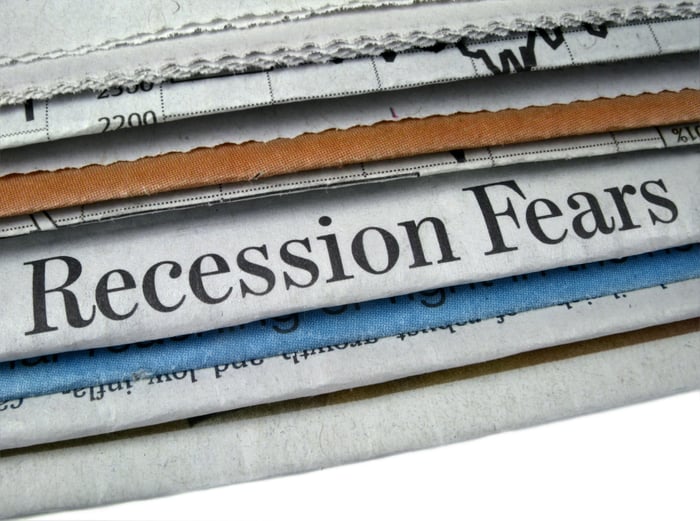Although the start of earnings season is coming into focus, one of the most important announcements of the year occurred last week. I'm talking about the release of the March meeting minutes from the Federal Open Market Committee (FOMC). The FOMC is the polic-making body that oversees our nation's monetary policy.
While most people have been focused on the Fed's language with regard to interest rates, it's what the FOMC had to say about the U.S. economy that should be raising eyebrows. As noted in the meeting minutes:
For some time, the forecast for the U.S. economy prepared by the staff had featured subdued real GDP growth for this year and some softening in the labor market. Given their assessment of the potential economic effects of the recent banking-sector developments, the staff's projection at the time of the March meeting included a mild recession starting later this year, with a recovery over the subsequent two years.
In other words, the Fed now expects the U.S. to enter a recession in the second-half of 2023.

Image source: Getty Images.
Though recessions can lead to volatility and uncertainty on Wall Street, they're also known for rolling out the red carpet for opportunistic long-term investors. Recessions can be an especially smart time to go shopping for growth stocks that offer industry-changing innovation and/or long-term catalysts.
What follows are three magnificent growth stocks to buy now if a U.S. recession is in the cards for later this year.
Nio
The first supercharged growth stock investors can confidently buy, even if the U.S. is headed toward a mild recession, is China-based electric vehicle (EV) manufacturer Nio (NIO -3.18%).
On one hand, auto stocks are cyclical businesses, which leaves them prone to demand/order weakness during recessions. But since Nio isn't selling EVs in the U.S., there's a good chance it'll avoid the demand weakness that would be expected to impact other U.S.-based auto stocks participating in China, such as Tesla, General Motors, and Ford Motor Company.
To build on the above, Nio's roughly half-dozen EV models tend to be geared toward middle-to-upper-income consumers. Individuals and couples with higher incomes are usually less likely to alter their buying habits during periods of minor economic disruption. Again, this "disruption" is expected to occur in the U.S. and not China. Nevertheless, Nio has the added protection of targeting a clientele that's unlikely to change its buying habits.
However, the best reason to buy into the Nio growth story is the company's traditional and out-of-the-box innovation. The company's ET7 and ET5 sedans, which respectively hit showrooms in March and September of 2022, have quickly dominated deliveries. Introducing at least one new model annually has helped Nio surpass 10,000 EVs delivered in all but one month since the end of May 2022.
In terms of nontraditional innovation, Nio unveiled its battery-as-a-service (BaaS) subscription in August 2020. BaaS allows buyers to charge, swap, and upgrade their batteries, as well as receive a discount on the purchase price of their EV. In return, BaaS is generating high-margin, recurring revenue for Nio and keeping its early buyers loyal to the brand.
Lovesac
A second magnificent growth stock to buy right now, even with the Fed expecting a recession, is small-cap furniture retailer Lovesac (LOVE 0.51%).
Similar to the automotive industry, furniture stocks are cyclical. We'd expect consumers to purchase less furniture when economic activity tapers off. But there are key competitive advantages Lovesac brings to the table that should help insulate its shareholders from short-term pain, while also offering ample long-term upside.
One of the key reasons Lovesac is so successful is the uniqueness of its products. Approximately 90% of its net sales come from sactionals, which are modular couches that can be rearranged dozens of ways to fit most living spaces. Sactionals can be outfitted with an assortment of high-margin add-ons (e.g., wireless charging and surround sound), have over 200 different cover choices, and use yarn derived from recycled plastic water bottles. There simply isn't anything like Lovesac's sactionals on the market.
Aside from being unique, sactionals tend to be pricier than a traditional sectional couch or loveseat. However, this isn't a problem for Lovesac, because it's targeting a higher-earning consumer, just like Nio. These consumers tend to be unfazed by minor economic hiccups.
The third big advantage for Lovesac is its omnichannel sales platform. Whereas most furniture retailers are almost completely reliant on foot traffic into their physical stores, Lovesac has had no trouble shifting its sales online or relying on its pop-up showrooms or partnerships to drive sales. In particular, pop-up shop partnerships with Costco Wholesale and Best Buy are really paying off.
The company's nimble sales platform plays a key role in keeping expenses (and inventory build) down, while lifting its operating margin well above its peers.

Image source: Getty Images.
Mastercard
The third magnificent growth stock that's a surefire buy right now, even if the Fed is correct and a U.S. recession is coming, is payment processor Mastercard (MA 0.79%).
To keep with the theme of this list, Mastercard is also a cyclical stock. When recessions occur, businesses and consumers usually spend less, which tends to have a negative effect on the fees Mastercard collects from merchants. However, a number of catalysts and advantages should allow Mastercard to navigate any economic downturn with ease, relative to other financial stocks.
As I noted earlier this week, one macro factor working in favor of payment processors like Visa and Mastercard is a huge decline in the U.S. personal savings rate. In recent months, the personal savings rate was at levels last seen 15 years ago. With less disposable cash to rely on, more consumers may turn to credit during an economic downturn. This would certainly be a positive for Mastercard, which has also benefited from historically high inflation.
Another reason Mastercard can be confidently purchased by long-term investors ahead of or during a recession is its conservative operating approach. This is a company that could have easily moved into lending a long time ago but has strictly stuck to facilitating payments.
This decision to stick to payment processing comes in particularly handy during economic downturns. Whereas lending institutions typically see delinquencies and loan losses rise, which necessitates capital being set aside to cover losses, Mastercard doesn't have any direct exposure to loan losses. Not having to set aside capital during economic downturns helps it bounce back faster than virtually all other financial stocks.
Mastercard's growth runway is also enormous. It's taken hold as the clear No. 2 in credit card network purchasing volume in the United States. Meanwhile, a majority of transactions outside the U.S. are still being conducted with cash. This presents a multidecade opportunity to offer new payment solutions in developing and emerging markets.





